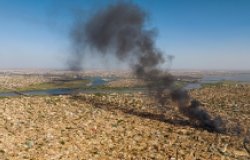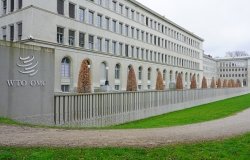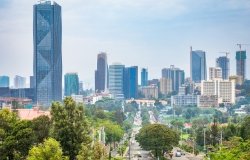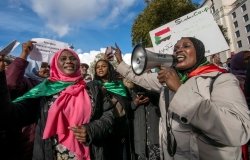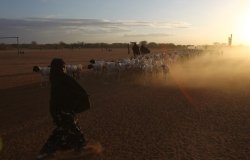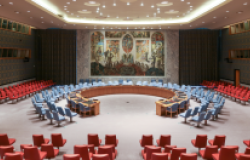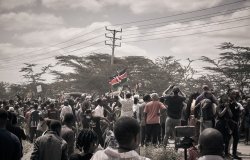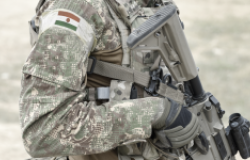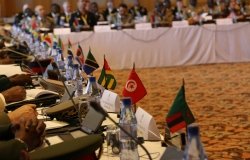
A blog of the Africa Program
A Search for Lasting Peace: Ending South Sudan’s Devastating Conflict

This excerpt was pulled from a policy brief written by Nhial Tiitmamer and Abraham Awolich and was originally posted by the Sudd Institute. The full policy brief can be found here on their website.
"For over two months, the people of South Sudan have been experiencing a renewed and devastating conflict that has inflicted significant suffering upon them. Triggered by an alleged failed coup, the International Crisis Group (ICG) estimates that 10,000 people have been killed and hundreds of thousands made destitute and forced once again into refuge. A search for solutions to end this conflict has started in earnest with peace negotiations in Addis Ababa, Ethiopia, under the auspices of the Intergovernmental Authority on Development (IGAD). Peace negotiations in Addis Ababa are a step in the right direction.
The causes of this conflict are not complicated. At the core, this conflict is a fight over the leadership of the Sudanese People's Liberation Movement (SPLM) party. It has little to do with any grand transformative agenda. Rather it stems from overly ambitious power seeking among the SPLM leaders. Lives, property and social fabrics that have been destroyed will not come back easily. However, South Sudanese can compensate themselves for the loss incurred by taking the opportunity to end this violence immediately and embark on a grand transformation of this society in a way that will bring durable peace and sustainable development to the lives of ordinary South Sudanese.
In this article, the Sudd Institute reviews, analyzes and recommends solutions to end this conflict and to prevent future outbreaks. The brief starts with the review and analysis of common conflict resolution tools for informed application in the peace process. It ends with a summary of recommendations.
What route should the present peace negotiations in Addis Ababa take?
For the talks in Addis Ababa to end the current violence and provide durable peace and national harmony, mediators and parties to the conflict should look at a number of peace settlement options and contextualize each to fit into the South Sudanese environment. Following are some possible solutions to the conflict various experts have proposed. Each of these concepts is analyzed and the merits or limitations of each are discussed in an attempt to make informed use in the peace process.
- Broad based inclusion of the South Sudanese populace in the peace process
- Power sharing arrangement
- Constitutional reform
- Accountability, justice, truth and reconciliation and
- Nation building and social transformation
Inclusive Peace Process
Inclusion in a peace process for all the groups affected by a conflict and future governance of a country has become one of the important tools in ending conflicts (Adan E. Suazo, 2013). There are two types of inclusion in the peace process: short and long term (Suazo, 2013). A short-term inclusion in a peace process usually involves warring parties, especially those bearing arms, as it is the case in this violent conflict in South Sudan. Long-term inclusion in the peace process includes the involvement of warring parties and other important society stakeholders in the peace process as well as in the implementation and running of the post-conflict affairs.
The main argument for an inclusive peace process is to prevent potential spoilers from destroying the peace outcomes (Suazo, 2013, Stedman, 1997, Newman and Richmond, 2005). Exclusive peace processes result in ''the emergence of leaders and factions who view a particular peace as opposed to their interests and who are willing to use violence to undermine the peace process'' (Suazo, 2013). Stedman (1997) defines spoilers as ''leaders and parties who believe that peace emerging from negotiations threatens their power, worldview, and interests, and use violence to undermine attempts to achieve it." South Sudan is an example of how exclusion in the peace process can threaten an outcome of a peace agreement. After the Comprehensive Peace Agreement (CPA) was signed in 2005, several armed groups were excluded in the CPA negotiations, so they threatened to derail the peace agreement unless they were included. The CPA had included a clause, which stated that the other armed groups should either join Khartoum or the SPLA. However, most of the other armed groups did not believe in this clause because they were not part of the peace process. They instead threatened to spoil the CPA. The spoiler threats posed to the CPA by the excluded other armed groups was, in part, solved through the Juba Declaration of January 2006, which allowed many armed militia forces to be integrated into the SPLA. The haste with which these militia groups were integrated created a disjointed army, which directly contributed to the current crisis.
It is very crucial to identify at the onset potential spoilers so that they can be included in a peace process to make it more comprehensive and sustainable (Papagianni, 2008, 2007). A spoiler factor can be avoided in the current peace talks in Addis by including representatives of civil society, political parties, government, rebels, and traditional leaders, youth and women. An inclusive peace process in the South Sudanese sense should embody two important elements: the involvement of all the stakeholders in the current process in Addis Ababa and a sustained engagement with the same much later in the process through community-to-community peace and dialogues as well as through the implementation stage.
If the peace process is left to the SPLM leaders who are fighting over the party's brand, important broader issues for nation building will most likely be left out. Civil Society, traditional leadership, youth and women bring important perspectives to the process, which can add a great value to the end results and help shape the future of this country. A community-to-community peace and dialogues similar to people-to-people peace conferences, which were held to reconcile the Nuer and Dinka communities in Wunlit and Liliir in 1999 and 2000, respectively, should be given due consideration. The involvement of community elders, women and youth is crucial in the community peace and dialogues. Convening community-to-community dialogues should be included as part of a final agreement in the ongoing peace efforts in Addis Ababa. In short, an inclusive peace processes can allow the stakeholders to contribute to the solution, own the process as well as commit to its implementation."
Continue reading here.
The Sudd Institute is a member of the Southern Voices Network of the Africa Program at the Wilson Center.
Photo attributed to the USAID Africa Bureau via Flickr (United States Government Work).
About the Author
Nhial Tiitmamer

Africa Program
The Africa Program works to address the most critical issues facing Africa and US-Africa relations, build mutually beneficial US-Africa relations, and enhance knowledge and understanding about Africa in the United States. The Program achieves its mission through in-depth research and analyses, public discussion, working groups, and briefings that bring together policymakers, practitioners, and subject matter experts to analyze and offer practical options for tackling key challenges in Africa and in US-Africa relations. Read more
